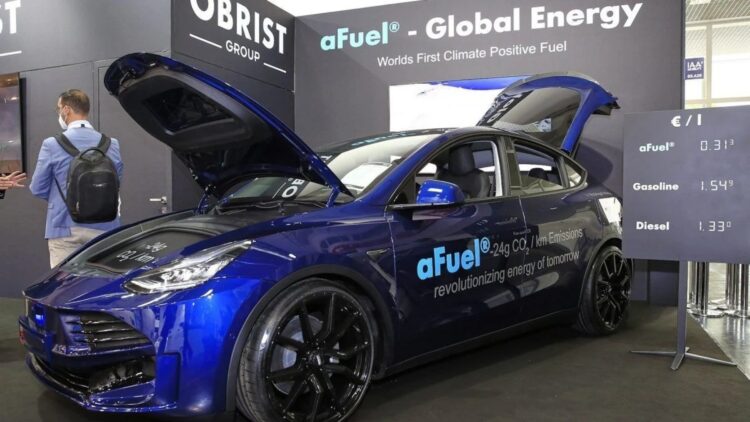The future of automotive fuel is one of the most discussed topics, and EVs are at the forefront. However, a new kid on the block can potentially compete with electric and hydrogen-powered vehicles.
This new fuel, methanol, is now on the rise as a promising candidate for this role. Methanol could be a game changer for the automotive industry because of its efficiency, which is seen as sustainable.
Methanol: the unexpected challenger to electric and hydrogen vehicles
One is methanol, a synthetic fuel produced using green hydrogen and CO2, which is also considered a real game-changer. The Obrist Hyper Hybrid is an example of this potential – it is a Tesla Model Y that has been modified. In contrast to other types of electric vehicles, this hybrid vehicle is designed to be flexible, as it can use methanol and battery power and has a fantastic range.
The methanol is generated by collecting CO2 emissions from industries, making it environmentally friendly. This unique concept eliminates the shortcomings of the electric and hydrogen vehicle systems to provide a realistic solution. The Obrist Hyper Hybrid is not just a concept car; it symbolizes a significant move towards decoupling personal mobility from fossil fuels.
Compared to hydrogen, methanol can be stocked and delivered much more conveniently; thus, this technology could avoid the issues regarding the lack of infrastructure that has limited the usage of hydrogen. Furthermore, the ability of methanol to be used in internal combustion engines makes it easy to incorporate into the present automobile market.
Nevertheless, methanol has several obstacles to transitioning to mainstream motor fuel. The process requires large-scale production, and the necessary framework should be developed through regulations. However, the advantages of methanol, such as the possibility of decreasing the emissions of greenhouse gases and the usage of fossil fuels, make it a perfect candidate for the future of transport.
The advantages of methanol over hydrogen
Hydrogen has long been believed to replace fossil fuels, though it also has disadvantages. However, Elon Musk has not been shy about expressing his doubts, and he listed the problems related to the storage and distribution of hydrogen. While ethanol has a few benefits, the following attributes make methanol preferable for large-spread usage.
Firstly, methanol can be synthesized from bio-renewable feedstock like biomass and captured CO2; hence, it is renewable. It is a liquid at room temperature and atmospheric pressure, an advantage over another fuel solution, such as hydrogen, which requires high-pressure vessels or cryogenic conditions. This ease of handling eliminates some of the infrastructure costs related to methanol, making it more economically feasible.
Secondly, with slight changes, methanol is compatible with internal combustion engines, so transitioning from traditional fossil fuels is possible. This compatibility with today’s technology means that vehicles that run on methanol can be brought into the market faster and more cheaply than vehicles that run on hydrogen or electricity, which would require large-scale changes in infrastructure and production.
Finally, methanol’s energy density is more remarkable than hydrogen’s, which means longer driving distances for automobiles. This makes methanol-powered cars more advantageous for long-distance travel, one of the issues we have seen with electric cars. Therefore, methanol could become a key solution for the future transport system as it is environmentally friendly, efficient, and realistic.
The road ahead for methanol-powered vehicles
Thus, the prospects of methanol as a fuel are apparent; however, several factors will determine its use. Therefore, increasing methanol uptake as a fuel requires enhancement of its yield through research and development. Such policies must also be developed with governments and industry players to fashion supportive policies and structural supports for methanol-based vehicles.
The use of methanol as a fuel will, therefore, depend on the acceptable level of perception and acceptance by the public. Public enlightenment and awareness creation programs can be helpful because consumers must know that methanol is valuable and safe for consumption. It is also true that demonstration projects like the Obrist Hyper Hybrid can help to create demand for methanol by demonstrating its uses.
The automotive industry must also accept change and be ready to seek out different fuel types. Indeed, the methanol solution is not a direct competitor to electric vehicles but a complementary one that can help overcome the challenges of battery technology. It is possible to achieve a more robust transportation future when the energy sources are diversified.
Therefore, methanol can potentially be the solution for electric and hydrogen vehicles. The idea is sustainable, does not require a radical shift in current technological infrastructure, and has relative practical benefits in the future of transportation. While the search for ways to decrease our dependence on oil and combat global warming progresses, methanol may be the key to the future of automobiles.

